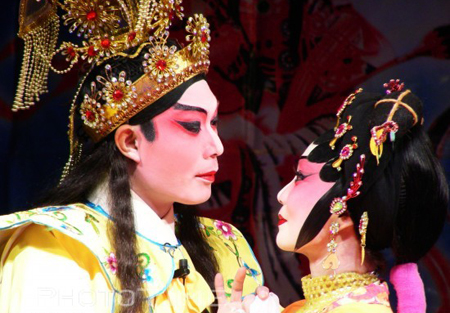HK strives to revive Cantonese Opera's heyday

Hong Kong artist Christie To is only 16, but her aspirations to stardom are rooted in a centuries-old art form fighting extinction: Cantonese opera.
In frenetic, capitalist Hong Kong, where Cantopop and film stars hold most sway over teenagers, To is a rarity.
Cast in the main role of a man for a professional production of "Fearless Sword," normally performed by older actors, To is one of ten young Cantonese Opera artists who've been striving to resurrect the ancient Chinese art form with modern audiences.
"We're trying to make Cantonese opera more youthful, to change impressions that it's an art for the old only," said Christie's mother, Marilyn To, who heads the government-funded Hong Kong young talent Cantonese opera troupe.
"There must be new life and the younger generation needs to take up the baton."
Cantonese opera, one of the major categories of Chinese opera, targets tens of millions of people speaking the lively dialect, mostly in south China's Guangdong and Guangxi provinces, including the cities of Hong Kong and Macau.
Following a golden age in the 1950s and 60s when the leading practitioners of Cantonese opera -- which involves singing, acting and sometimes martial arts -- spilled into Hong Kong from China, the indigenous art form has been on a steady decline.
"My heart has slowly been turning grey," said old master Man Chin-Shui who has devoted 60-years of his life to practicing and teaching Cantonese opera, mostly in Hong Kong. "To revive Cantonese opera again in Hong Kong will be very difficult."
Fading masterpiece
The United Nations recently proclaimed Cantonese opera, which originated in Canton, or Guangzhou, and became popular in Hong Kong during the Sino-Japanese war, as one of the "masterpieces of the oral and intangible heritage of humanity."
But in Hong Kong, the recognition may have come too late.
It has proven an uphill battle to find younger audiences and performers given its musty image, uncertain career prospects and extreme hardships in mastering the art form.
"If you don't put time into it, it's not meaningful," said Doris Kwan, one of the members of To's young opera troupe. "But it's very difficult to make a living," added Kwan, who holds two part-time jobs.
While some critics say Cantonese opera's lack of melodies and rather old-fashioned plots and lyrics need a thoroughly modern makeover, purists of the art form have resisted such changes.
Initiatives like the Hong Kong young talent Cantonese Opera troupe have provided a platform for amateurs, and the local government including senior officials with a passion for the art form are pushing mandatory opera education in local schools, but some experts say much more has to be done.
"They don't learn from a young age, they lack a foundation and this is a big challenge," said Man. "You can't rely on these youngsters as the next generation, I think the real successors for Cantonese Opera are in mainland (China)."
Some, however, fear an assimilation of Hong Kong's unique tradition that's considered less political and rigid than that in Communist China, and which was once energized by legendary figures like librettist Tong Dick-san and actor Yam Kim-fai.
"Merging with the Cantonese opera in Canton is not very wise because Hong Kong's own tradition, the smaller one, will eventually be homogenized," wrote Yu Siu-wah, a Chinese opera expert and the author of "Such are the Fading Sounds."
"Conforming to the mainstream pan-Chinese opera, the characteristics and the uniqueness of local Hong Kong Cantonese Opera will be compromised," he added.
 0 Comments
0 Comments







Comments